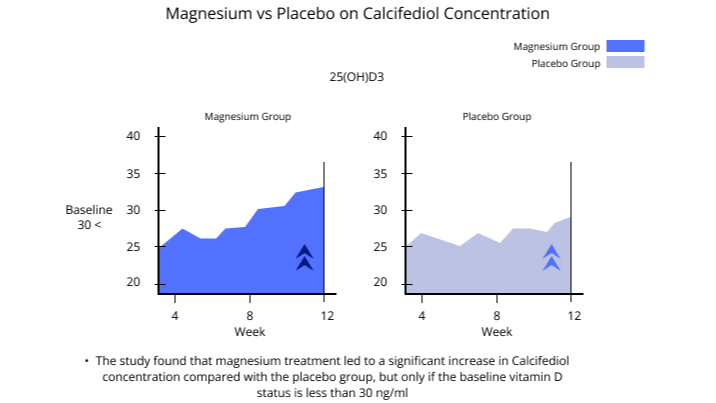
The Influence of Magnesium on Vitamin D and Metabolism of Our Body

Table Of Contents
Type of Vitamin D and its Importance
Vitamin D is important for bone health, but it may also have other benefits. The evidence is mixed on whether vitamin D can help prevent cancer and cardiovascular disease.
Calcifediol, also known as calcidiol [25(OH)D3], is a form of vitamin D that is synthesized in the liver and kidneys. The main function of Calcifediol is to maintain normal blood levels of calcium and phosphorus by promoting their absorption from food in the intestines.
Can Magnesium Support the Potency of Vitamin D?
The 2015 Dietary Guidelines Advisory Committee determined that magnesium is under-consumed relative to the estimated average requirement. This is one of the shortfall nutrients in the US population.
For patients with “Mg-dependent vitamin-D-resistant rickets,” (a condition characterized by reduced Calcifediol and impaired parathyroid response) intramuscular infusion of vitamin D alone did not lead to any improvements in vitamin D deficiency biochemical measures.
However, magnesium supplementation did support the vitamin D treatment. Furthermore, observational studies in the general US population reported that magnesium intake significantly interacted with vitamin D intake in affecting biomarkers of vitamin D synthesis and metabolism depending on baseline vitamin D levels.
Based on these observations, we hypothesize that magnesium supplementation may support vitamin D synthesis and metabolism, and reduce the risk of cancer and cardiovascular disease.
The Study on Magnesium and possible effects on our bodies Metabolism and Vitamin D
For this study 180 participants completed the Placebo Pill Controlled Crossover Trial ( PPCCT). The participants were assigned to a customized dose of magnesium supplementation.
The average daily dose of personalized magnesium supplementation was 205.52 mg, ranging from 77.25 to 389.55 mg for 12 weeks. Compliance with the treatment regimen was very high for both the placebo and magnesium supplementation groups.
The Result of the study
The study found that magnesium treatment led to a significant increase in Calcifediol concentration compared with the placebo group, but only if the baseline vitamin D status is less than 30 ng/ml

The Conclusion
The study suggests that optimal magnesium may help support vitamin D synthesis and metabolism. This is beneficial, however, it will depend on the current vitamin D concentration of the subject.
Reference
Magnesium Status and Supplementation influence Vitamin D Status and Metabolism
Related Posts



Quick Links
Legal Stuff




